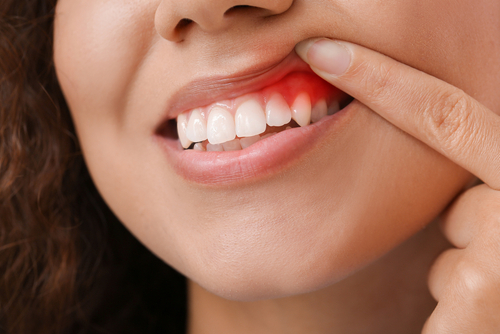Have you noticed that your gums are looking red or swollen? Do your teeth feel especially sensitive to hot or cold foods?
These are just a couple of the signs that you might have gum disease.
Keep reading to learn more about gum disease and how dentists treat it!
What is Gum Disease?
Gum disease is a common condition that is caused by a build-up of plaque on the teeth. This plaque contains harmful bacteria, which can accumulate and harden below your gum line, eventually causing infection of the gum tissue.
The early stage of gum disease is called gingivitis. It is a common oral health condition affecting an estimated half of American adults over thirty.
When diagnosed and treated early, gingivitis can be reversed. Improving your daily oral hygiene routine and getting regular cleanings and checkups with your dentist can ensure that gingivitis doesn’t develop into a more severe stage of gum disease.
If left untreated, gingivitis can develop into periodontal disease, which causes your gums to pull away from your teeth, allowing pockets to form and trapping harmful bacteria and often leading to tooth loss. Periodontal disease is irreversible but manageable with periodontal treatment.
How Do I Know If I Have Gum Disease?
The best way to know if your symptoms are caused by gum disease is to visit your dentist for an exam. However, some of the signs that you may have gum disease include the following:
- Intense tooth sensitivity
- Swollen and inflamed gums
- Teeth that shift or are loose
- Bleeding gums when brushing or flossing
- Receding gums
- Chronic bad breath
What Causes Gum Disease?
The most common cause of gum disease is poor oral hygiene habits, but there are a number of other causes as well. These include:
- A family history of gum disease
- Smoking or the use of chewing tobacco
- Hormonal shifts in women
- Certain prescription medications
- Crowded or crooked teeth
How Do Dentists Treat Gum Disease?
If you are diagnosed with early gum disease, your dentist can offer you a number of non-surgical treatment options right in their office.
Scaling
Scaling is a deep-cleaning procedure that can usually be performed by your regular hygienist. During treatment, the hardened plaque, called tartar, is carefully scraped off the teeth below the gumline.
Root Planing
Often done along with scaling, root planing is a procedure that removes the plaque and tartar on the roots of your teeth. During this treatment, a special tool is used to expose the roots, allowing for deep cleaning of the roots.
This deep cleaning leaves the roots smooth and encourages gum reattachment.
Oral Antibiotics
After scaling and root planing, your dentist might prescribe an antibiotic toothpaste or mouth rinse. These prescription medications help your gums heal faster and encourage the re-forming of the gums’ tight seal around your teeth.
Periodontal Treatment
If you are diagnosed with more advanced gum disease, also called periodontal disease, your dentist may refer you to a periodontist for treatment. Treatment for periodontal disease includes more frequent dental cleanings and may require a surgical procedure to maintain gum health and prevent tooth loss.
How To Prevent Gum Disease
While gum disease is treatable, prevention is the best treatment of all! You can prevent the onset of gum disease by taking these steps to ensure your oral health:
Establish and Follow a Good Daily Oral Health Care Routine
This routine should include twice-daily brushing and at least once-daily flossing. If possible, use an electric toothbrush for more thorough cleaning!
Visit Your Dentist
It’s best to visit your dentist at least twice a year for professional cleanings and oral exams. Eat a healthy diet, balanced diet, and limit your sugar intake.
Healthy gums are the foundation of your overall oral health. If you notice the signs of early gum disease, visiting your dentist for diagnosis and treatment can protect the health of your gums and prevent more serious periodontal disease from harming your smile!
Do you think you might be showing signs of gum disease? Schedule an appointment at Merry Dental in Billerica, MA, today!


